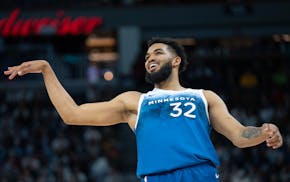The self-appointed wizards responsible for numbers that allege to rate fielding range insist that Derek Jeter has been a subpar shortstop, even before the declines that go with age and injury.
There has been a kinder view of Jeter's fielding from mere observers of the grand old game: Jeter had a habit of saving his best plays for occasions of the highest importance.
This is Jeter's last go-round, and his Yankees will be visiting 17 opposing ballparks during the regular season. The Twins followed protocol by hosting a five-minute pregame ceremony, in which Jeter received a pair of gifts:
There was a check for $10,000 presented to Jeter's Turn 2 Foundation that assists drug-troubled youth, and also the last second-base bag ever used for a game at the Metrodome.
Simple though it was, this was nearly as creative as the rocking chair made of broken bats the Twins presented to Yankees closer Mariano Rivera on his farewell tour in 2013.
The last Twins game played in the Dome was a 4-1 loss to the Yankees on Oct. 11, 2009, that swept the home team out of the playoffs in three games. And the decisive play of that game offered an endorsement of the idea that Jeter invariably was where he had to be when the Yankees needed him.
The Yankees were leading 2-1 entering the bottom of the eighth, and Phil Hughes — having an excellent season in front of Rivera in the bullpen — came in to try to hold it. Nick Punto opened with a fly-ball double, and Denard Span followed with a bouncer through the middle.
Punto was certain the ball was headed into center field and ignored coach Scott Ullger's stop sign. Jeter got to the bouncer behind second and sent a throw to catcher Jorge Posada. Punto skidded to a stop, tried to retreat but was out at third.
There went the rally. There went the game. There went the series. There went the Dome as a big-league ballpark. Nice play, Derek.
Twins manager Ron Gardenhire said the idea to present the second-base bag came from a member of the organization who remembered that Jeter was standing near second when he threw out the last batter (Brendan Harris) in the Dome.
When Gardenhire was asked about the low opinion Jeter gets from the computer crowd for his fielding, the rival manager said this, with obvious sincerity:
"He doesn't miss plays. He's rangy, he has good hands, he makes the throws … he's the whole package at shortstop, as far as I'm concerned.
"If I'm a manager and it's the biggest situation in a World Series, I want the ball hit to Derek Jeter … because I know I'm going to get an out."
Jeter was playing his 144th game against the Twins on Saturday — 130 in the regular season and 14 (12-2) in the playoffs. He will be in the lineup again Sunday. He will be back in Target Field nine days later to make his eighth start for the American League in the All-Star Game.
There was considerable competition for the AL start in Jeter's early seasons, with Alex Rodriguez as a shortstop in Seattle and Texas, and with Nomar Garciaparra in Boston.
Somehow, Garciaparra and then A-Rod got a bit "overmuscled" for playing shortstop, as Jeter remained the sleek prototype of a middle infielder. There were loud suggestions that Rodriguez (not Jeter) should be the shortstop when he first came to the Yankees in 2004, but as A-Rod grew to gigantic size, third base became enough for him to handle.
Minnesota fans joined in the growing national disregard for Rodriguez, and responded to this by loudly booing both him and Jeter. The Jeter reaction here was always a puzzle that finally came to end with cheers on Thursday, as he started his final series against the Twins.
The Minneapolis swan song for Jeter in the All-Star Game will be the first time that event has been held here since 1985. A case can be made that the four greatest shortstops in the game's history have been in their primes in the three decades since then:
The magnificent fielders, Ozzie Smith and Omar Vizquel, and the powerful ironman, Cal Ripken Jr., and now Jeter, a winner, a hitter and a playmaker at the best of times.
I don't think Jeter can be first on that list — not ahead of Ripken — but it's close.
Patrick Reusse can be heard 3-6 p.m. weekdays on AM-1500. • preusse@startribune.com

Reusse: Success on court helped Timberwolves do strong business

Reusse: Taylor's story. 'I just bought the Minnesota Timberwolves.'

Reusse: Back from injury, Towns doesn't have to carry load


